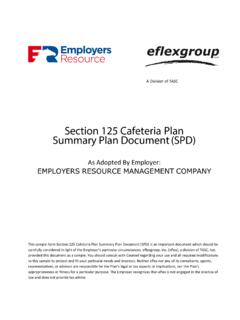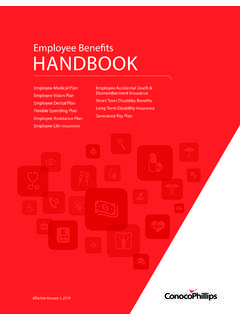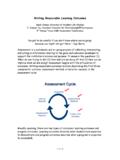Transcription of Health Flexible Spending Account – Frequently Asked Questions
1 CX6007 042014 Copyright 2014 CONEXIS Benefits Administrators, LP. All Rights Reserved. 1 Health Flexible Spending Account Health Flexible Spending Account Frequently Asked Questions What is a Health Flexible Spending Account ? A Health Flexible Spending Account (FSA) is part of your benefits package. This plan lets you use pre-tax dollars to pay for eligible Health care expenses for you, your spouse, and your eligible dependents. Here s how an FSA works. Money is set aside from your paycheck before taxes are taken out. You can then use your pre-tax FSA dollars to pay for eligible Health care expenses throughout the plan year. You save money on expenses you re already paying for, like doctors office visits, prescription drugs, and much more. Why is it a good idea to have a Health FSA? Health FSAs benefit everyone single individuals, families, and soon-to-be retirees. Setting aside pre-tax dollars means you pay fewer taxes and increase your take-home pay by your tax savings.
2 You save money on eligible expenses that you are paying for out of your pocket. The amount you save depends on your tax bracket. For example, if you are in the 30 percent tax bracket, you can save $30 on every $100 spent on eligible Health care expenses such as dental checkups, prescription eyeglasses, and bandages. Discover how your savings can add up by visiting And depending on how your Health FSA plan is set up, you may be able to carry over up to $500 of unused funds to the following plan year. What expenses are covered under a Health FSA? Only eligible expenses can be reimbursed under the FSA. These expenses are defined by IRS rules and your employer s plan . You can learn about your employer s plan by reading the summary plan Description (SPD). Eligible Health FSA expenses are those that you pay for out of your pocket for medical care that s provided to you, your spouse, and eligible dependents.
3 Generally, IRS rules state that medical care includes items and services that are meant to diagnose, cure, mitigate, treat, or prevent illness or disease. Transportation that is primarily for medical care is also included. You can find a list of eligible expenses at Here are some examples: Your Health plan deductible (the amount you pay before your plan starts paying a share of your costs) Your share of the cost for doctor s office visits and prescription drugs Your share of the cost for eligible dental care, including exams, X-rays, and cleanings Your share of the cost for eligible vision care, including exams, eyeglasses, contact lenses, and laser eye surgery The list of eligible expenses is based on IRS rules. Here are some other IRS rules you should know about: No double-dipping Expenses reimbursed under your Health FSA cannot be reimbursed under any other plan or program.
4 Only your out-of-pocket Health care expenses are eligible for reimbursement. Plus, expenses reimbursed under a Health FSA may not be deducted when you file your tax return. Timing is everything FSAs have a start date and an end date, and the time in between is called the plan year. Expenses must be incurred during the FSA plan year. As noted in IRS guidelines, "expenses are incurred when the employee (or the employee s spouse or dependents) is provided with the medical care that gives rise to the medical expenses, and not when you are formally billed, charged for, or pay for the medical care. This means the date of service must be within the current plan year and not when you pay for the service. CX6007 042014 Copyright 2014 CONEXIS Benefits Administrators, LP. All Rights Reserved. 2 Health Flexible Spending Account Are over-the-counter medicines eligible expenses? Yes, but they require a prescription.
5 IRS rules state that over-the-counter (OTC) medicines and drugs are not eligible for reimbursement under your Health FSA unless prescribed by a doctor (or another person who can issue a prescription) in the state where you purchase the OTC medicines. These rules do not apply to insulin (including OTC insulin). Any claim you submit for reimbursement that has an OTC medicine expense must include a Request for Reimbursement Form and one of the following types of supporting documentation: A written or electronic OTC prescription along with an itemized cash register receipt that includes the merchant name, name of the OTC medicine or drug, purchase date, and amount A printed pharmacy statement or receipt from a pharmacy that includes the patient s name, the Rx number, the date the prescription was filled, and the amount Here are some of the many examples of OTC medicines and drugs that require a prescription: Allergy and sinus: Actifed, Benadryl, Claritin, Sudafed Antacids: Mylanta, Pepcid AC, Prilosec, TUMS Aspirin and pain relievers: Advil, Excedrin, Motrin, Tylenol Cold and flu: Nyquil, Theraflu, Tylenol Cold & Flu Diaper rash ointments.
6 Balmex, Desitin First aid creams, sprays, and ointments: Bactine, Neosporin Sleep aids: Sominex, Tylenol PM, Unisom Sleep Tabs What over-the-counter items are eligible expenses? There are many OTC items eligible for reimbursement through your Health FSA, and you can use your benefit card to purchase these items. Here are some of the many examples: Bandages, Band-Aids, and gauze Batteries for hearing aids, blood glucose monitors, etc. Diabetic supplies and test kits First aid kits High blood pressure monitors Thermometers Can I use my FSA funds to stock up on over-the-counter items? No. You can only use your FSA for items that you can reasonably use during the plan year. If you stockpile OTC items, you won t be reimbursed. What expenses are not covered under a Health FSA? Expenses that are not approved are called ineligible expenses. Ineligible Health FSA expenses include: Cosmetic surgery and procedures, including teeth whitening Herbs, vitamins, and supplements used for general Health OTC medicines that you don t have a prescription for (except insulin) Insurance premiums Family or marriage counseling Personal use items such as toothpaste, shaving cream, and makeup Prescription drugs imported from another country You can t use your FSA for: Services that take place before or after your coverage period Expenses that are reimbursed by another plan or program, including a Health care plan CX6007 042014 Copyright 2014 CONEXIS Benefits Administrators, LP.
7 All Rights Reserved. 3 Health Flexible Spending Account These are only a few of the examples of expenses that aren t covered by a Health FSA. You can find a full list of eligible and ineligible expenses at How do I use my FSA for orthodontic services? These services aren t provided the same way as other types of Health care. Most of the time, orthodontic services are provided over a long period of time and may extend beyond the plan year, and services tend to be hard to match up with actual costs. As a result, the reimbursement process is different, and you have two ways to be reimbursed: 1. Entire cost of treatment This method allows you to be reimbursed for the full amount of the orthodontia contract. You can do this only if you paid the full amount of services during the plan year. To get reimbursed, send in these items: Completed reimbursement request form Proof of payment for the entire contract, including start date and expected end date Proof of payment made during the applicable plan year in which you are requesting reimbursement 2.
8 Monthly approach This method allows you to be reimbursed for the first round of treatment (usually called banding fees) and then monthly reimbursement after that. To get reimbursed for banding fees, submit: A completed reimbursement request form Your treatment plan or itemized statement that includes the start date and the expected end date Proof of the initial down payment After the first reimbursement request is submitted, send in these items for monthly reimbursement: Your completed reimbursement request form An itemized statement or monthly coupons from the orthodontist Proof of the monthly payment Is there a limit to how much I can contribute to my Health FSA? Yes. As a result of the Affordable Care Act, employee contributions have been capped for Health FSA plans. The annual limit is $2,500, and you cannot contribute more than this amount. However, your plan may have an annual limit that is less.
9 Please review your summary plan Description (SPD) to find out the annual limit for your plan . Is there a limit to how much my employer can contribute to my Health FSA? The statutory $2,500 limit does not apply to certain non-elective employer contributions made to an employee s Health FSA. It also does not apply to contributions made to other types of FSAs (such as dependent care FSA), Health savings accounts (HSAs), or Health reimbursement arrangements (HRAs). Can my spouse also contribute to an FSA? Yes, if your spouse is eligible to make contributions to a Health FSA. Each spouse may contribute up to the $2,500 maximum limit to their own Health FSA. This applies even if both spouses participate in the same Health FSA plan sponsored by the same employer. CX6007 042014 Copyright 2014 CONEXIS Benefits Administrators, LP. All Rights Reserved. 4 Health Flexible Spending Account How much money is available during the plan year?
10 Your entire Health FSA election is available on the first day of the plan year. If your FSA is active, your available funds decrease as your claims are paid. You can find out your available funds by logging in to your online Account at How often are reimbursements made? Your employer chooses the reimbursement schedule. You can find out how often reimbursements are made by reading the SPD. How do I keep track of my Account activity? Your FSA information is available anytime day or night by logging in to your online Account at Log in and find: Real-time Account balance Claims status Reimbursement payment history Where can I get a reimbursement request form? This form is available online at Just log in to your Account to find it. What do I need to submit along with a reimbursement form? You must save all itemized receipts and other supporting documentation for every FSA expense.





